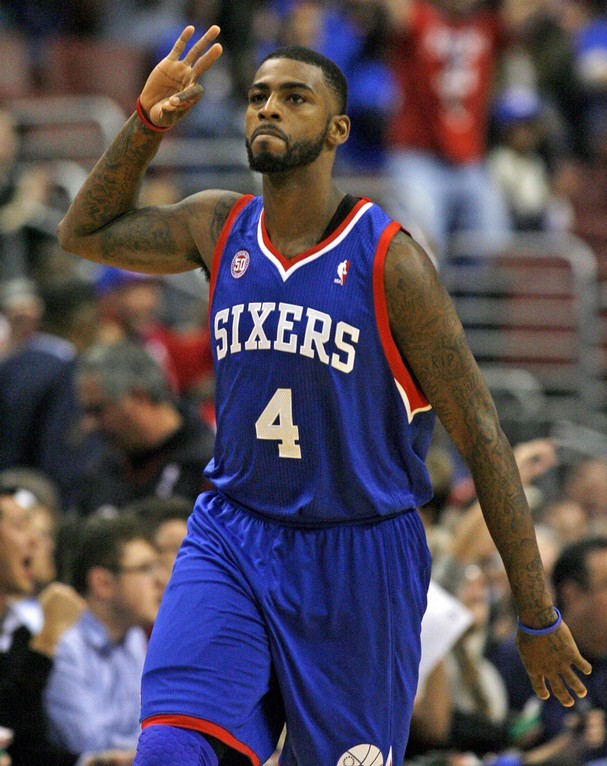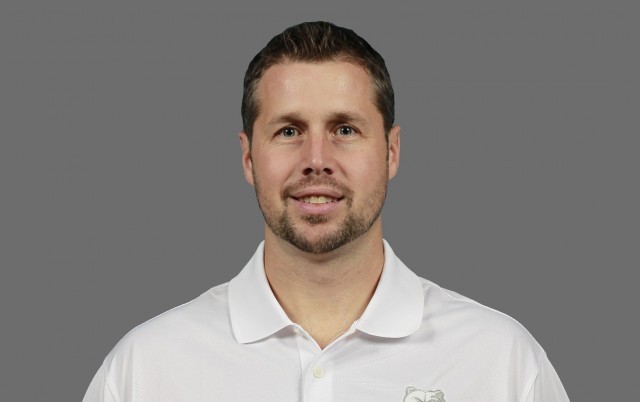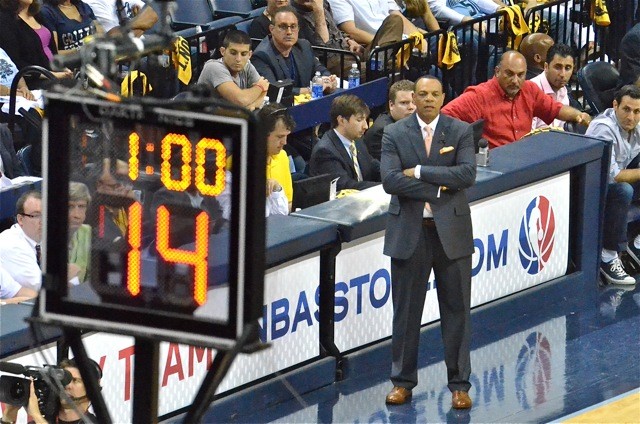The Grizzlies had the most successful season in the short, mostly futile history of the franchise last season with their run to the Western Conference Finals. There was a sense last May that anything was possible: The team could bring an NBA championship to Memphis, or they could get swept by the San Antonio Spurs (which is what actually happened, since the Spurs were on their own star-crossed run to a seven-game finals with the eventual champion, Miami Heat). Either way, it was Memphis’ time to shine. The Grizzlies, in what felt like a culmination of something that started in the 2011 first-round victory over San Antonio, put the whole city on their backs and tried to take us to the promised land. It was a magical couple of weeks, even if it didn’t end up going according to plan.
Since then, a few things have changed with the Grizzlies: Lionel Hollins — whose contract was up at the end of last season — wasn’t brought back, and assistant coach Dave Joerger — who won multiple championships in the NBA D-League and the CBA — was promoted to the head spot. The bench was completely overhauled, bringing in several new faces to play alongside some of the familiar ones — players like Kosta Koufos, Nick Calathes, and incoming rookie Jamaal Franklin. The offense is being retooled around the tandem of Mike Conley and reigning Defensive Player of the Year Marc Gasol. Things are different, and there are a lot of unanswered questions facing the Grizzlies as they head into the 2013-14 regular season, questions we probably won’t know the answers to until the season is well under way. Here are 10 of them, along with a brief discussion of “what we know so far” with each.
1: Was hiring Dave Joerger instead of bringing back Lionel Hollins the right move?
The question of whether Dave Joerger is the right head coach for the Grizzlies and the question of whether Lionel Hollins should have been brought back on a new contract are really two distinct issues. As to Hollins, I’ll just say this: The Grizzlies’ new ownership and new front office didn’t hire him, and they didn’t think he was the right kind of coach to implement the philosophy with which they want to run the organization. Whether or not he was winning basketball games, he simply didn’t have the approach that the front office wanted in their head coach, and thus his fate was sealed.
Joerger is more of a question mark, but, to my mind, not much of one: He’s got clear winning credentials at the minor-league level, and he’s been with the Grizzlies since 2007 as an assistant. He’s a guy who excelled at player development in the minor leagues, and that capability goes hand-in-hand with the way the new Grizzlies leadership wants to run the team. We heard it from owner Robert Pera himself on Media Day: The Grizzlies want to emulate the Spurs’ model of creating a perennial contender through player development and smart roster moves. Joerger’s coaching credentials and his approach to developing raw young guys make him an important part of that equation.
2: Will Zach Randolph be in Memphis at the end of the season?
Randolph, 32, has been a defining figure in the emergence of the Grizzlies on the NBA scene as a legitimate force to be reckoned with, but he’s got a player option in his contract for $16.5 million next year that could potentially cripple the team’s ability to make other roster moves, especially since Gasol, Conley, and Tony Allen will combine for almost $30 million next year. Randolph’s game has started to change as he ages. He’s getting his shots blocked more and having to work harder for every basket. It hasn’t been all bad, as he led the league in offensive rebounds last season, but how many of those rebounds were off his own missed shots? As his game starts to decline, which it will inevitably do at some point, will Randolph accept a more limited role, or will he still want to be the Man? All of these factors will determine whether Randolph is still in town next year or not. At this point, there’s no way to know.
 Larry Kuzniewski
Larry Kuzniewski
Guard-forward Nick Calathes
3: Is Nick Calathes the backup point guard the Grizzlies have been missing?
Calathes, a 24-year-old rookie with a winning pedigree in Euroleague and Eurocup play (you may remember him from his college year at the University of Florida), has already made an impression in the preseason with his playmaking ability and drives to the basket. His size and quickness allow him to use his excellent court vision to find the open man — sometimes when the open man isn’t even looking, sending a basketball zipping into the expensive seats. (Hold on to your beers down there, courtside folks.) Even given the limited reliability of preseason games as indicators for future success, Calathes brings a confidence and maturity to the floor that we haven’t seen from a rookie since Greivis Vásquez, and Calathes moves a lot better than Vásquez. That said, he’s still unproven and has some adjusting to do to the NBA game. If Calathes can be a floor general to spell Conley for large stretches, though, the Grizzlies will be in better shape point-guard-wise than they’ve been in years.
4: How much will the Grizzlies miss Rudy Gay’s offensive efficiency?
Next question.
 Larry Kuzniewski
Larry Kuzniewski
Forward Ed Davis
5: Who is going to be the backup power forward?
The popular opinion is that Ed Davis was brought to Memphis by the front office specifically to be the power forward of the future and that Davis is all but guaranteed to ascend to Zach Randolph’s starting spot when Randolph is inevitably moved. Some national media types even speculated that Randolph would be traded this offseason in order to clear the way for Davis. That didn’t happen and for good reason: Davis still needs time to develop. He doesn’t finish at the rim as well as he probably should, and he spent most of last year on the bench in Lionel Hollins’ infamous doghouse rather than on the court gaining valuable experience. He’s likely to get those minutes from Dave Joerger, who has stressed time and again his belief and confidence in Davis’ abilities. In preseason thus far, he’s been true to his word, playing Davis a lot and starting him in Randolph’s absence against the Bucks.
What’s made it a question is the play of Jon Leuer. Leuer, who barely saw the floor last year after being acquired from the Cavaliers in January, was signed to a long-term (though relatively inexpensive) deal this summer and has entered the 2013 preseason playing like a man with something to prove. He’s looked confident, comfortable, and assured on the court, and his long-range jumper has proved valuable to the Grizzlies’ floor spacing.
With Davis still needing some time to develop before the Grizzlies can really evaluate whether his basket is the one in which the Grizzlies want to put all of their eggs, it’s not beyond the realm of possibility that Leuer and Davis could share the backup minutes at the four spot depending on matchups. Ultimately, this depth is a good thing, especially on a Griz team that has been severely lacking in frontcourt depth for as long as anyone can remember. But it certainly won’t make answering questions about whether Ed Davis is the future any easier.
6: If the Grizzlies struggle this year, what will that do to their burgeoning fan base?
This is one question nobody likes to talk about. The Grizzlies’ recent run of successful seasons has brought with it a level of Griz Fever heretofore unseen in Memphis. The sales of unauthorized and/or unofficial Grizzlies T-shirts alone have probably been enough to boost the local economy by 50 percent. Everyone is talking about the Grizzlies, and Griz fans are making a name for themselves nationally as loud, proud, and die-hard.
But what happens to those fans if the team hovers around .500 this year and struggles to get itself together under the first year of a new coach? What happens if, God forbid, an important player suffers a major injury and misses a significant stretch of the season? Are the fans who made articles of clothing out of Growl Towels going to stick it out, or will they turn on the team and the front office, in light of all of the changes made by the new regime to a roster and organization that was (from outside appearances, anyway) working?
To be clear, I don’t think the team will trend downward this year, but the Western Conference finals are a high bar that not many teams are able to reach — much less reach two years in a row. If the team’s newly won fans expect the same level of performance this year and things start to go south, it could create some interesting tension around the team.
 Larry Kuzniewski
Larry Kuzniewski
Guard Jerryd Bayless
7: What will be the first in-season roster move the Grizzlies make?
I don’t think the Grizzlies expected Jerryd Bayless to pick up the player option in his contract and stay with the Grizzlies another year. I think they expected him to become a free agent and sign a contract that he earned by playing well for the Grizzlies last year. That’s not what happened, though: Bayless stayed in Memphis, and now the Grizzlies have an awful lot of shooting guards. Tony Allen, Quincy Pondexter, Bayless, and rookie Jamaal Franklin can all play the position, along with the occasional Nick Calathes. Bayless’ responsibilities as backup point guard were absolved last year after he proved to be a much more effective playmaker off the ball, especially when paired with Mike Conley.
At the same time, Tayshaun Prince is probably entering the twilight phase of his career, after many years of making deep playoff runs with the Detroit Pistons, and his conditioning failed him in last year’s playoffs even though he showed flashes of “the old Tayshaun” before getting injured in the Oklahoma City series.
Both of these guys, I’d say, are probably available to a team that makes the Grizzlies the right offer. What that offer would be I can’t say, but given that Prince is owed $7.2 million this year and $7.7 million next year, you’d have to think some salary relief would be involved. Don’t misunderstand me: I think both players could also stick around and make valuable contributions to the Grizzlies this year. I just think that of everyone on the roster, they’re probably the two who would be traded first if the right option came along.
8: Is the Wi-Fi in FedExForum going to work this year?
Robert Pera says yes. We shall see. One gets the impression that it may be even harder to make internet access work for 18,000 people sitting in the same room than it is to evaluate draft prospects.
9: What effect will Kosta Koufos have coming off the Grizzlies’ bench?
Koufos started 81 games for the Denver Nuggets last season, so the fact that the Grizzlies were able to pry him away from Denver for a never-quite-healthy Darrell Arthur and what essentially amounts to pocket lint is surprising. Koufos represents the best chance Marc Gasol has ever had of not having to play 40-plus minutes a night this year. He averaged eight points and almost seven rebounds per game last year in Denver, and his size, toughness, and basketball IQ mean that Gasol has a legitimate NBA center as a backup for maybe the first time in his career. (I’m not counting Darko Milicic.) A reduced workload for Gasol means a fresher Gasol in the playoffs, and anything that makes that happen while strengthening the Griz bench is a win.
 Larry Kuzniewski
Larry Kuzniewski
Guard Mike Conley
10: Where will the Grizzlies finish in the Western Conference this year?
The Western Conference is as competitive and as close as it’s ever been. The Spurs, Thunder, Grizzlies, and Clippers all look primed to make another run, and the Rockets and Warriors made significant improvements in the off-season.
The Grizzlies are going to have to work that much harder for home-court advantage this year, and simply catching one or two unlucky breaks over the course of the season may be enough to put them down to the fifth or sixth seed.
Last year’s seeding battle was close, but this year it looks to be even closer. The Grizzlies could legitimately finish anywhere from second to about sixth in the standings, and the separation between those spots could be as small as a game or two. The breaks of the season will determine it as much as their actual win/loss record will.
The offseason brought with it a host of changes to the Grizzlies from top to bottom. Really, this season is the first manifestation of the philosophy brought in with last year’s ownership change, and we’re just now seeing the fruits of that transition on the court and in the front office.
We know what the Grizzlies organization is trying to do. The only question is whether they’ll be able to do it. As of right now, it’s anybody’s guess — yet another question that remains to be answered.


 Larry Kuzniewski
Larry Kuzniewski  Larry Kuzniewski
Larry Kuzniewski  Larry Kuzniewski
Larry Kuzniewski  Larry Kuzniewski
Larry Kuzniewski 


![Dave Joerger [right] may be next in line as Lionel Hollins tenure as Grizzlies head coach ends. Dave Joerger [right] may be next in line as Lionel Hollins tenure as Grizzlies head coach ends.](https://altnuxt-wp-assets.s3.amazonaws.com/sites/4/dave-joerger-right-may-be-next-in-line-as-lionel-hollins-tenure-as-grizz/u/original/3431003/1370966656-dsc_6566.jpeg)
